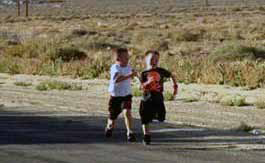When Gov. Brian Sandoval arrived in Hawthorne on Nov. 25 he didn’t come with a message for students or to try and sell his policies to voters, he came to listen.
While Sandoval did briefly speak to the student body of Mineral County High School/Junior High School, the primary purpose of his visit was to talk about the Jobs for America’s Graduates program with the local participants.
JAG is a grant-funded program. There’s a national organization, but the program is administered by each of the 31 states that participate.
The national organization’s goals involve making sure students graduate and are prepared to move to the next level of education, be it college or a trade school, but the program in Mineral County has a slightly different spin.
“My job is to help [students] graduate, first and foremost,” said Delicia Jernigan, high school JAG specialist at MCHS. “But secondly is helping them make that transition into college or into the workplace. So we’re working with employability skills, but also helping them with scholarships; getting them signed up for the ACTs and SATs; tutoring. Whatever they need, I’m able to help them with that.”
Much of the instruction for students in the JAG program goes on in the classroom, but there are some crucial life lessons students learn before even walking in.
“Before any of my kids enter my classroom they have to introduce themselves to me,” Jernigan said. “Introducing yourself to somebody is extremely important, knowing how to do that.”
This year, students will also spend time doing a community service project and hope to put on a talent show during the spring, she said.
In January the senior students will teach a computer class at the Mineral County Senior Center in Hawthorne, Jernigan said.
“It helps our kids see that you can get involved in our community,” Jernigan said. “But also, most importantly, we’re getting them ready for the workplace.”
Students also develop a professional resume and cover letter to make finding a first job easier.
“The idea is that when they walk out of the classroom they can walk right into a job interview and feel confident,” she said.
Students in the program are volunteers who qualify because of “life difficulties” Jernigan said. Life difficulties can range from a chronically low GPA or high school suspension to a lack of social skill or physical disability, Jernigan said.
The JAG program can also help fill in financial gaps for its students, Jernigan said. For instance, if a student can’t afford a work uniform of “job attire,” or afford public transportation while in college, there’s funding in the program to help the student.
But the most valuable thing students walk away with after the JAG program is a sense of self, Jernigan said.
“They’re going to be able to walk out of this class […] with those skills and be able to walk into whatever the setting is and be themselves and present themselves and attempt to get what they’re looking for,” Jernigan said.


